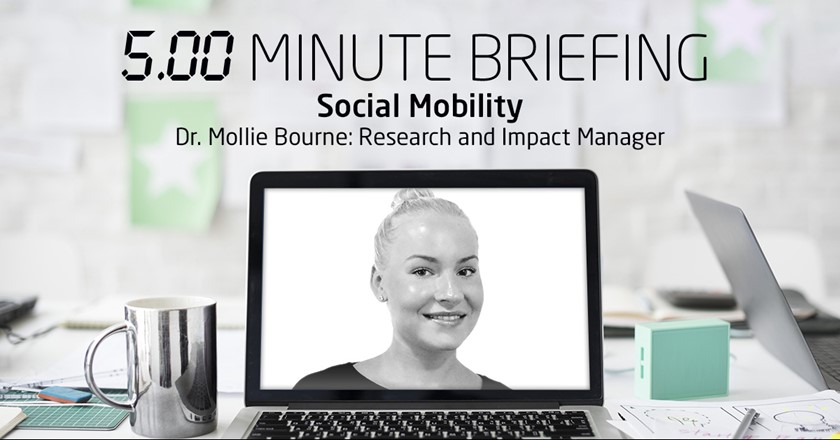Mar 4, 2020

Dr. Mollie Bourne is Research and Impact Manager at EngineeringUK. She tells us about her research work on social mobility within the engineering sector.
What is your role at EngineeringUK and what kind of things are you working on?
I’m Research and Impact Manager at EngineeringUK and I work on quite a broad range of projects within the team.
I lead on our evaluation activities, carried out to ensure our programmes are as effective as they can be for the young people we look to inspire, and to make sure that we can evidence our impact for our other key stakeholders. We’ve got some new and exciting evaluation projects coming up – for example, a project looking at the impact of The Big Bang Fair on young people’s longer-term educational decisions and a project looking at the effectiveness of the Robotics Challenge Primary Pilot for primary-school aged children predominantly from disadvantaged backgrounds who participate in the IET’s First LEGO League Jr programme.
In addition to evaluation, I carry out research and analysis intended to provide a solid evidence base for the wider engineering community – for example, I contribute to our flagship publication ‘Engineering UK: The state of engineering’ report and work on our research briefings which dig a little deeper into issues that are particularly relevant for the sector, such as gender representation and opportunities for social mobility.
What is your background and how does it give additional insight to your work at EngineeringUK?
My background is in academic research – in particular on educational inequalities and social mobility. I gained my PhD in Social Statistics from Manchester University where I looked at unequal patterns of educational attainment and participation by social class and ethnicity. I then went on to work as a postdoctoral researcher at Oxford University, where I worked on projects assessing the influence of cognitive ability and social background in determining individuals’ chances of educational and professional success.
My background in education research and social mobility has been really useful for my work at EngineeringUK – particularly because we know that there are patterns of unequal representation by sociodemographic characteristics in STEM education and the engineering workforce, so I’ve been well-placed to input into research activities that seek to address these issues.
Tell me a bit more about (insights from) the social mobility in engineering report and why it’s important?
The social mobility briefing was a really important piece of work, as there is very little by way of evidence in this area for the engineering sector. The intention was to pull together as much evidence as possible about patterns of inequality or underrepresentation for disadvantaged groups in STEM education and engineering, to think through the barriers that are faced by these groups and to provide some background to inform decisions on what we might be able to do as a sector to increase opportunities for young people who are less advantaged.
While there was a frustratingly limited lack of data and evidence to draw upon, we were still able to bring out some really important new findings – for example, we showed that among individuals working in an engineering career, those from advantaged social backgrounds were significantly more likely to have secured a ‘top spot’ (an intermediate, managerial or professional role) than those from disadvantaged backgrounds. We also found that the effect of social class on engineers’ employment outcomes varies with other characteristics – social class has the largest influence for women and those from a BME background.
What do you enjoy the most about your job?
I really enjoy working in an organisation which is filled with people who really care about young people, about the power of education and about the possibility of inspiring young people in engineering, improving our economy and our society as a result.
The work we do in the research team is really interesting and fulfilling and it’s great to know that we are in a good position to pave the way for change by producing new and important evidence for the engineering community.
Is there anything else you're looking forward to working on?
I’m really looking forward to working on The Big Bang Fair long-term evaluation project. This is going to be a step up from what we’ve done by way of evaluating our activities in the past, and I’m really excited about producing new and robust evidence for us to improve The Fair.
< Back to News & Views
